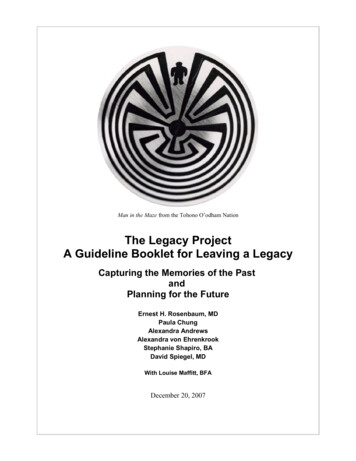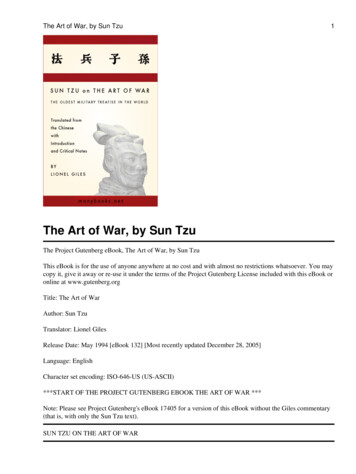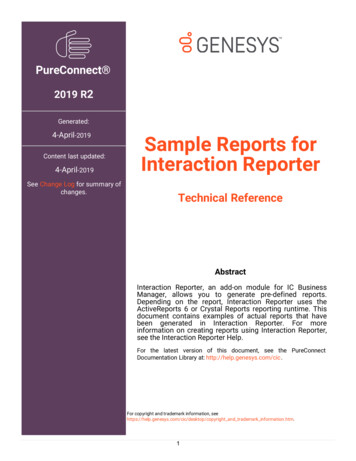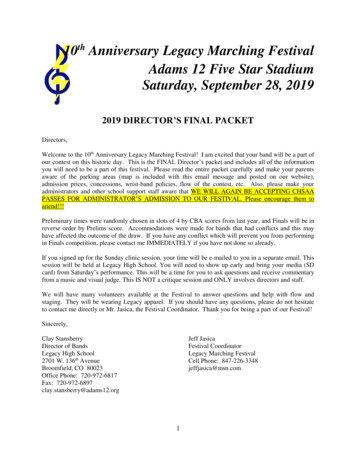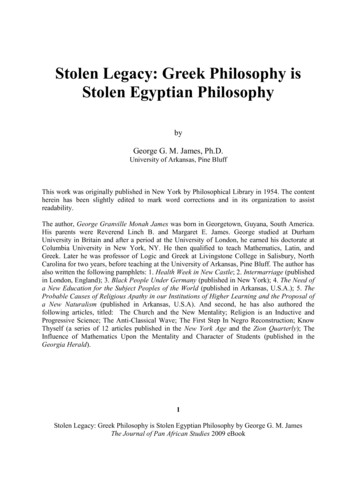
Transcription
Stolen Legacy: Greek Philosophy isStolen Egyptian PhilosophybyGeorge G. M. James, Ph.D.University of Arkansas, Pine BluffThis work was originally published in New York by Philosophical Library in 1954. The contentherein has been slightly edited to mark word corrections and in its organization to assistreadability.The author, George Granville Monah James was born in Georgetown, Guyana, South America.His parents were Reverend Linch B. and Margaret E. James. George studied at DurhamUniversity in Britain and after a period at the University of London, he earned his doctorate atColumbia University in New York, NY. He then qualified to teach Mathematics, Latin, andGreek. Later he was professor of Logic and Greek at Livingstone College in Salisbury, NorthCarolina for two years, before teaching at the University of Arkansas, Pine Bluff. The author hasalso written the following pamphlets: 1. Health Week in New Castle; 2. Intermarriage (publishedin London, England); 3. Black People Under Germany (published in New York); 4. The Need ofa New Education for the Subject Peoples of the World (published in Arkansas, U.S.A.); 5. TheProbable Causes of Religious Apathy in our Institutions of Higher Learning and the Proposal ofa New Naturalism (published in Arkansas, U.S.A). And second, he has also authored thefollowing articles, titled: The Church and the New Mentality; Religion is an Inductive andProgressive Science; The Anti-Classical Wave; The First Step In Negro Reconstruction; KnowThyself (a series of 12 articles published in the New York Age and the Zion Quarterly); TheInfluence of Mathematics Upon the Mentality and Character of Students (published in theGeorgia Herald).1Stolen Legacy: Greek Philosophy is Stolen Egyptian Philosophy by George G. M. JamesThe Journal of Pan African Studies 2009 eBook
ContentsIntroduction(A) Characteristics of Greek Philosophy; (B) The Aims of The BookPart IChapter IGreek Philosophy Is Stolen Egyptian Philosophy1. The teachings of the Egyptian Mysteries reached other lands centuries before it reachedAthens; 2. The authorship of the individual doctrines is extremely doubtful; 3. The chronologyof Greek philosophers is mere speculation; 4. The compilation of the history of Greekphilosophy was the plan of Aristotle executed by his school.Chapter IISo-called Greek Philosophy was Alien to the Greeks and their Conditions of LifeThe period of Greek philosophy (640–322 B.C.) was a period of internal and external wars andwas unsuitable for producing philosophers.Chapter IIIGreek Philosophy was the Offspring of the Egyptian Mystery System1. The Egyptian theory of salvation became the purpose of Greek philosophy; 2. Circumstancesof identity between the Egyptian and Greek systems are shown; 3. The abolition of Greekphilosophy with the Egyptian Mysteries identifies them; 4. How the African continent gave itsculture to the Western World.2Stolen Legacy: Greek Philosophy is Stolen Egyptian Philosophy by George G. M. JamesThe Journal of Pan African Studies 2009 eBook
Chapter IVThe Egyptians Educated The Greeks1. The effects of the Persian Conquest; 2. The effects of the Conquest of Egypt by Alexanderthe Great; 3. The Egyptians were the first to civilize the Greeks; 4. Alexander visits the Oracleof Ammon in the Oasis of Siwah.Chapter VThe Pre-Socratic Philosophers and the Teachings Ascribed to Them1. The earlier Ionion philosophers and their doctrines; 2. Pythagoras and his doctrines; 3. TheEleatic philosophers and their doctrines. 4. The later Ionion philosophers and their doctrines; 5.Summary of conclusions concerning the Pre-Socratic philosophers and the history of the FourQualities and Four Elements. (a) The doctrines of the early Ionic, the Eleatic and the later Ionicphilosophers and Pythagoras are traced to their Egyptian origin; (b) The doctrine of the FourQualities and Four Elements is traced to its Egyptian origin; (c) Plagiarism shown to be acommon practice among the Greek philosophers who borrowed from one another but chieflyfrom Pythagoras who obtained his ideas from the Egyptians; (d) The doctrine of the Atom byDemocritus is traced to its Egyptian origin, as well as his large number of books. He taughtnothing new.Chapter VIThe Athenian Philosophers1. SOCRATES1. His Life: (a) Date and place of birth; (b) His economic status and personality; (c) His trialand death; (d) Crito's attempt to smuggle him out of prison; (e) Phaedo describes the final scenebefore his death.2. Doctrines: The doctrines of (a) The Nous; (b) The Supreme Good; (c) Opposites andharmony; (d) The immortality of the soul and (e) Self knowledge.3. Summary of Conclusions: (a) The doctrines of Socrates are traced to their Egyptian origin, ashe taught nothing new; (b) The importance of the farewell conversation of Socrates with hispupils and friends is set forth.3Stolen Legacy: Greek Philosophy is Stolen Egyptian Philosophy by George G. M. JamesThe Journal of Pan African Studies 2009 eBook
2. PLATO(I) His early life; (II) His travels and academy; (III) His disputed writings; (IV) His doctrines.1. The theory of ideas and its application to natural phenomena including (a) the real andunreal; (b) the Nous and (c) creation.2. The ethical doctrines concerning (a) the highest good; (b) definition of virtue and; (c) thecardinal virtues.3. The doctrine of the Ideal state whose attributes are compared with the attributes of the souland justice.(V) Summary of Conclusions:(a) The doctrines of Plato are traced to their Egyptian origin, as he taught nothing new;(b) Magic is shown to be the key to the interpretation of ancient religion and philosophy;(c) The authorship of his books is disputed by modern scholars, and ancient historians deny hisauthorship of the Republic and Timeas;(d) The allegory of the charioteer and winged steeds is traced to its Egyptian origin.3. ARISTOTLE(I) (a) His early life and training; (b) His own list of books; (c) Other list of books; (II)Doctrines; (III) Summary of Conclusions.A The doctrines are traced to their Egyptian origin, as he taught nothing new; B (1) The libraryof Alexandria was the true source of Aristotle's large numbers of books; (2) The lack ofuniformity between the list of books points to doubtful authorship; C The discrepancies anddoubts in this life.4Stolen Legacy: Greek Philosophy is Stolen Egyptian Philosophy by George G. M. JamesThe Journal of Pan African Studies 2009 eBook
Chapter VIIThe Curriculum of The Egyptian Mystery System1. The education of Egyptian Priests according to their Orders;2. The education of the Egyptian Priests in: (a) The Seven Liberal Arts; (b) Secret systems oflanguages and mathematical symbolism; (c) Magic.3. A comparison of the curriculum of the Egyptian Mystery System with the list of books saidto be drawn up by Aristotle himself.Chapter VIII:The Memphite Theology is the Basis of all Important Doctrines of Greek Philosophy1.(a) The history, description and complete text of the Memphite Theology are given and thesubject matter is divided into three parts;(b) The text of the first part is followed by the philosophy which the first part teaches;(c) The text of the second part is followed by the philosophy which the second part teaches;(d) The text of the third part is followed by the philosophy which the third part teaches.2. The Memphite Theology is shown to be the source of modern scientific knowledge;(a) The identity of the creation of the Ennead with the Nebular Hypothesis and;(b) The identity of the Sun God Atom with the atom of Science.5Stolen Legacy: Greek Philosophy is Stolen Egyptian Philosophy by George G. M. JamesThe Journal of Pan African Studies 2009 eBook
3. The Memphite Theology opens great possibilities for modern scientific research:(a) The Greek concept of the atom is shown to be erroneous; (b) With the new interpretation ofthe atom the Memphite Theology provides a vast field of scientific secrets yet to be discovered.Part IIChapter IXSocial Reformation through the New Philosophy of African Redemption1. Social ReformationThe knowledge that the African continent gave civilization the Arts and Sciences, Religion andPhilosophy is des- tined to produce a change in the mentality both of the White and Blackpeople. 2. There are three persons in the drama of Greek philosophy: (a) Alexander the Great;(b) Aristotle's School and; (c) The Ancient Roman Government who are responsible for a falsetradition about Africa and the social plight of its peoples; (3) Both the White and Black peopleare common victims of a false tradition about Africa and this fact makes both races partners inthe solution of the problem of racial reformation. (4) The methods suggested for racialreformation: (a) Reeducation of both groups by worldwide dissemination of Africa'scontribution to civilization; (b) The abandonment of the false worship of Greek intellect; (c)Special attention must be given to the re-education of missionaries and a constant demand madefor a change in missionary policy.2. The New Philosophy of African Redemption1. A statement and explanation of the new philosophy of African Redemption are made; 2.Black people must cultivate methods of counteraction against: (a) The false worship of Greekintellect; (b) Missionary literature and exhibition and; (c) must demand a change in missionarypolicy.AppendixNotes6Stolen Legacy: Greek Philosophy is Stolen Egyptian Philosophy by George G. M. JamesThe Journal of Pan African Studies 2009 eBook
IntroductionCharacteristics of Greek PhilosophyThe term Greek philosophy, to begin with is a misnomer, for there is no such philosophy inexistence. The ancient Egyptians had developed a very complex religious system, called theMysteries, which was also the first system of salvation.As such, it regarded the human body as a prison house of the soul, which could be liberated fromits bodily impediments, through the disciplines of the Arts and Sciences, and advanced from thelevel of a mortal to that of a God. This was the notion of the summum bonum or greatest good, towhich all men must aspire, and it also became the basis of all ethical concepts. The EgyptianMystery System was also a Secret Order, and membership was gained by initiation and a pledgeto secrecy. The teaching was graded and delivered orally to the Neophyte; and under thesecircumstances of secrecy, the Egyptians developed secret systems of writing and teaching, andforbade their Initiates from writing what they had learnt.After nearly five thousand years of prohibition against the Greeks, they were permitted to enterEgypt for the purpose of their education. First through the Persian invasion and secondly throughthe invasion of Alexander the Great. From the sixth century B.C. therefore to the death ofAristotle (322 B.C.) the Greeks made the best of their chance to learn all they could aboutEgyptian culture; most students received instructions directly from the Egyptian Priests, but afterthe invasion by Alexander the Great, the Royal temples and libraries were plundered andpillaged, and Aristotle's school converted the library at Alexandria into a research centre. Thereis no wonder then, that the production of the unusually large number of books ascribed toAristotle has proved a physical impossibility, for any single man within a life time.The history of Aristotle's life, has done him far more harm than good, since it carefully avoidsany statement relating to his visit to Egypt, either on his own account or in company withAlexander the Great, when he invaded Egypt. This silence of history at once throws doubt uponthe life and achievements of Aristotle. He is said to have spent twenty years under the tutorshipof Plato, who is regarded as a Philosopher, yet he graduated as the greatest of Scientists ofAntiquity. Two questions might be asked: (a) how could Plato teach Aristotle what he himselfdid not know?; and (b) why should Aristotle spend twenty years under a teacher from whom hecould learn nothing? This bit of history sounds incredible. Again, in order to avoid suspicionover the extraordinary number of books ascribed to Aristotle, history tells us that Alexander theGreat, gave him a large sum of money to get the books. Here again the history sounds incredible,and three statements must here be made.7Stolen Legacy: Greek Philosophy is Stolen Egyptian Philosophy by George G. M. JamesThe Journal of Pan African Studies 2009 eBook
(a) In order to purchase books on science, they must have been in circulation so as to enableAristotle to secure them. (b) If the books were in circulation before Aristotle purchased them,and since he is not supposed to have visited Egypt at all, then the books in question must havebeen circulated among Greek philosophers. (c) If circulated among Greek philosophers, then wewould expect the subject matter of such books to have been known before Aristotle's time, andconsequently he could not be credited either with producing them or introducing new ideas ofscience.Another point of considerable interest to be accounted for was the attitude of the Atheniangovernment towards this so-called Greek philosophy, which it regarded as foreign in origin andtreated it accordingly. Only a brief study of history is necessary to show that Greek philosopherswere undesirable citizens, who throughout the period of their investigations were victims ofrelentless persecution, at the hands of the Athenian government. Anaxagoras was imprisoned andexiled; Socrates was executed; Plato was sold into slavery and Aristotle was indicted and exiled;while the earliest of them all, Pythagoras, was expelled from Croton in Italy. Can we imagine theGreeks making such an about turn, as to claim the very teachings which they had at firstpersecuted and openly rejected? Certainly, they knew they were usurping what they had neverproduced, and as we enter step by step into our study the greater do we discover evidence whichleads us to the conclusion that Greek philosophers were not the authors of Greek philosophy, butthe Egyptian Priests and Hierophants.Aristotle died in 322 B.C. not many years after he had been aided by Alexander the Great tosecure the largest quantity of scientific books from the Royal Libraries and Temples of Egypt. Inspite however of such great intellectual treasure, the death of Aristotle marked the death ofphilosophy among the Greeks, who did not seem to possess the natural ability to advance thesesciences. Consequently history informs us that the Greeks were forced to make a study of Ethics,which they also borrowed from the Egyptian "summum bonum" or greatest good. The two otherAthenian Philosophers must be mentioned here, I mean Socrates and Plato; who also becamefamous in history as philosophers and great thinkers. Every school boy believes that when hehears or reads the command "know thyself", he is hearing or reading words which were utteredby Socrates. But the truth is that the Egyptian temples carried inscriptions on the outsideaddressed to Neophytes and among them was the injunction "know thyself". Socrates copiedthese words from the Egyptian Temples, and was not the author. All mystery temples, inside andoutside of Egypt carried such inscriptions, just like the weekly bulletins of our modern Churches.Similarly, every school boy believes that when he hears or reads the names of the four cardinalvirtues, he is hearing or reading names of virtues determined by Plato. Nothing has been moremisleading, for the Egyptian Mystery System contained ten virtues, and from this source Platocopied what have been called the four cardinal virtues, justice, wisdom, temperance, andcourage. It is indeed surprising how, for centuries, the Greeks have been praised by the WesternWorld for intellectual accomplishments which belong without a doubt to the Egyptians or thepeoples of North Africa.8Stolen Legacy: Greek Philosophy is Stolen Egyptian Philosophy by George G. M. JamesThe Journal of Pan African Studies 2009 eBook
Another noticeable characteristic of Greek philosophy is the fact that most of the Greekphilosophers used the teachings of Pythagoras as their model; and consequently they haveintroduced nothing new in the field of philosophy. Included in the Pythagorean system we findthe doctrines of (a) opposites (b) Harmony (c) Fire (d) Mind, since it is composed of fire atoms,(e) Immortality, expressed as transmigration of Souls, (f) The summum bonum or the purpose ofphilosophy. And these of course are reflected in the systems of Heraclitus, Parmenides,Democritus, Socrates, Plato and Aristotle.The next thing that is peculiar about Greek philosophy is its use in literature. The EgyptianMystery System was the first secret Order of History and the publication of its teachings wasstrictly prohibited. This explains why Initiates like Socrates did not commit to writing theirphilosophy, and why the Babylonians and Chaldaeans who were very closely associated withthem also refrained from publishing those teachings.We can at once see how easy it was for an ambitious and even envious nation to claim a body ofunwritten knowledge which would make them great in the eyes of the primitive world. Theabsurdity however, is easily recognized when we remember that the Greek language was used totranslate several systems of teachings which the Greeks could not succeed in claiming. Suchwere the translation of Hebrew Scriptures into Greek, called the Septuagint; and the translationof the Christian Gospels, Acts and the Epistles in Greek, still called the Greek New Testament. Itis only the unwritten philosophy of the Egyptians translated into Greek that has met with such anunhappy fate: a legacy stolen by the Greeks.On account of reasons already given, I have been compelled to handle the subject matter of thisbook, in the way it has been handled: namely (a) with a frequency of repetition, because it is themethod of Greek philosophy, to use a common principle to explain several different doctrines,and (b) the quotation and analysis of doctrines, because it is the object of this book to establishthe Egyptian Origin and this cannot be so satisfactorily done if the doctrines are not presented.Greek philosophy is somewhat of a drama, whose chief actors were Alexander the Great,Aristotle and his successors in the peripatetic school, and the Roman Emperor Justinian.Alexander invaded Egypt and captured the Royal Library at Alexandria and plundered it.Aristotle made a library of his own with plundered books, while his school occupied the buildingand used it as a research centre. Finally, Justinian the Roman Emperor abolished the Templesand schools of philosophy i.e. another name for the Egyptian Mysteries which the Greeksclaimed as their product, and on account of which, they have been falsely praised and honouredfor centuries by the world, as its greatest philosophers and thinkers.9Stolen Legacy: Greek Philosophy is Stolen Egyptian Philosophy by George G. M. JamesThe Journal of Pan African Studies 2009 eBook
This contribution to civilization was really and truly made by the Egyptians and the Africancontinent, but not by the Greeks or the European continent. We sometimes wonder why thepeople of African descent find themselves in such a social plight as they do, but the answer isplain enough. Had it not been for this drama of Greek philosophy and its actors, the Africancontinent would have had a different reputation, and would have enjoyed a status of respectamong the nations of the world.This unfortunate position of the African continent and its peoples appears to be the result ofmisrepresentation upon which the structure of race prejudice has been built, i.e. the historicalworld opinion that the African continent is backward, that its people are backward, and thattheir civilization is also backward.Finally, the dishonesty in the movement of the publication of a Greek philosophy, becomes veryglaring, when we refer to the fact, purposely that by calling the theorem of the Square on theHypotenuse, the Pythagorean theorem, it has concealed the truth for centuries from the world,who ought to know that the Egyptians taught Pythagoras and the Greeks, what mathematics theyknew.I want to mention here that among the many books which I found helpful in my present work are"The Intellectual Adventure of Man" and "The Egyptian Religion" by Professor Henri Frankfortand "The Mediterranean World in Ancient Times" by Professor Eva Sandford.George G. M. James10Stolen Legacy: Greek Philosophy is Stolen Egyptian Philosophy by George G. M. JamesThe Journal of Pan African Studies 2009 eBook
The Aim of the BookThe aim of the book is to establish better race relations in the world, by revealing a fundamentaltruth concerning the contribution of the African continent to civilization. It must be borne inmind that the first lesson in the humanities is to make a people aware of their contribution tocivilization; and the second lesson is to teach them about other civilizations. By thisdissemination of the truth about the civilization of individual peoples, a better understandingamong them, and a proper appraisal of each other should follow. This notion is based upon thenotion of the Great Master Mind: Ye shall know the truth, and the truth shall make you free.Consequently, the book is an attempt to show that the true authors of Greek philosophy were notthe Greeks; but the people of North Africa, commonly called the Egyptians; and the praise andhonor falsely given to the Greeks for centuries belong to the people of North Africa, andtherefore to the African continent . Consequently this theft of the African legacy by the Greeksled to the erroneous world opinion that the African continent has made no contribution tocivilization, and that its people are naturally backward. This is the misrepresentation that hasbecome the basis of race prejudice, which has affected all people of color.For centuries the world has been misled about the original source of the Arts and Sciences; forcenturies Socrates, Plato and Aristotle have been falsely idolized as models of intellectualgreatness; and for centuries the African continent has been called the Dark Continent, becauseEurope coveted the honor of transmitting to the world, the Arts and Sciences.I am happy to be able to bring this information to the attention of the world, so that on the onehand, all races and creeds might know the truth and free themselves from those prejudices whichhave corrupted human relations; and on the other hand, that the people of African origin mightbe emancipated from their serfdom of inferiority complex, and enter upon a new era of freedom,in which they would feel like free men, with full human rights and privileges.11Stolen Legacy: Greek Philosophy is Stolen Egyptian Philosophy by George G. M. JamesThe Journal of Pan African Studies 2009 eBook
Part IChapter I: Greek Philosophy is Stolen Egyptian Philosophy1. The Teachings of the Egyptian Mysteries Reached Other Lands Many Centuries Before itReached AthensAccording to history, Pythagoras after receiving his training in Egypt, returned to his nativeisland, Samos, where he established his order for a short time, after which he migrated to Croton(540 B.C.) in Southern Italy, where his order grew to enormous proportions, until his finalexpulsion from that country. We are also told that Thales (640 B.C.) who had also received hiseducation in Egypt, and his associates: Anaximander, and Anaximenes, were natives of Ionia inAsia Minor, which was a stronghold of the Egyptian Mystery schools, which they carried on.(Sandford's The Mediterranean World, p. 195–205). Similarly, we are told that Xenophanes (576B.C.), Parmenides, Zeno and Melissus were also natives of Ionia and that they migrated to Eleain Italy and established themselves and spread the teachings of the Mysteries.In like manner we are informed that Heraclitus (530 B.C.), Empedocles, Anaxagoras andDemocritus were also natives of Ionia who were interested in physics. Hence in tracing thecourse of the so-called Greek philosophy, we find that Ionian students after obtaining theireducation from the Egyptian priests returned to their native land, while some of them migrated todifferent parts of Italy, where they established themselves.Consequently, history makes it clear that the surrounding neighbors of Egypt had all becomefamiliar with the teachings of Egyptian Mysteries many centuries before the Athenians, who in399 B.C. sentenced Socrates to death (Zeller's Hist. of Phil., p. 112; 127; 170–172) andsubsequently caused Plato and Aristotle to flee for their lives from Athens, because philosophywas something foreign and unknown to them. For this same reason, we would expect either theIonians or the Italians to exert their prior claim to philosophy, since it made contact with themlong before it did with the Athenians, who were always its greatest enemies, until Alexander'sconquest of Egypt, which provided for Aristotle free access to the Library of Alexandria.The Ionians and Italians made no attempt to claim the authorship of philosophy, because theywere well aware that the Egyptians were the true authors. On the other hand, after the death ofAristotle, his Athenian pupils, without the authority of the state, undertook to compile a historyof philosophy, recognized at that time as the Sophia or Wisdom of the Egyptians, which hadbecome current and traditional in the ancient world, which compilation, because it was producedby pupils who had belonged to Aristotle's school, later history has erroneously called Greekphilosophy, in spite of the fact that the Greeks were its greatest enemies and persecutors, and hadpersistently treated it as a foreign innovation.12Stolen Legacy: Greek Philosophy is Stolen Egyptian Philosophy by George G. M. JamesThe Journal of Pan African Studies 2009 eBook
For this reason, the so-called Greek philosophy is stolen Egyptian philosophy, which first spreadto Ionia, thence to Italy and thence to Athens. And it must be remembered that at this remoteperiod of Greek history, i.e., Thales to Aristotle 640 B.C.–322 B.C., the Ionians were not Greekcitizens, but at first Egyptian subjects and later Persian subjects.Zeller's Hist. of Phil.: p. 37; 46; 58; 66–83; 112; 127; 170172.William Turner's Hist. of Phil.: p 34; 39; 45; 53.Roger's Student Hist. of Phil.: p. 15.B. D. Alexander's Hist. of Phil.: p. 13; 21.Sandford's The Mediterranean World p. 157; 195–205.A brief sketch of the ancient Egyptian Empire would also make it clear that Asia Minor or Ioniawas the ancient land of the Hittites, who were not known by any other name in ancient days.According to Diodorus and Manetho, High Priest in Egypt, two columns were found at NysaArabia; one of the Goddess Isis and the other of the God Osiris, on the latter of which the Goddeclared that he had led an army into India, to the sources of the Danube, and as far as the ocean.This means of course, that the Egyptian Empire, at a very early date, included not only theislands of the Aegean sea and Ionia, but also extended to the extremities of the East.We are also informed that Senusert I, during the 12th Dynasty (i.e., about 1900 B.C.) conqueredthe whole sea coast of India, beyond the Ganges to the Eastern ocean. He is also said to haveincluded the Cyclades and a great part of Europe in his conquests.Secondly, the "Amarna Letters" found in the government offices of the Egyptian King, Iknaton,testify to the fact, that the Egyptian Empire had extended to western Asia, Syria and Palestine,and that for centuries Egyptian power had been supreme in the ancient world. This was in the18th Dynasty i.e., about 1500 B.C.We are also told that during the reign of Tuthmosis III, the dominion of Egypt extended not onlyalong the coast of Palestine: but also from Nubia to Northern Asia. (Breadsted's Conquest ofCivilization p. 84; Diodorus 128; Manetho; Strabo; Dicaearchus; John Kendrick's Ancient Egyptvol. I).13Stolen Legacy: Greek Philosophy is Stolen Egyptian Philosophy by George G. M. JamesThe Journal of Pan African Studies 2009 eBook
2. The Authorship of the Individual Doctrines is Extremely DoubtfulAs one attempts to read the history of Greek philosophy, one discovers a complete absence ofessential information concerning the early life and training of the so-called Greek philosophers,from Thales to Aristotle. No writer or historian professes to know anything about their earlyeducation. All they tell us about them consists of (a) a doubtful date and place of birth and (b)their doctrines; but the world is left to wonder who they were and from what source they gottheir early education, and would naturally expect that men who rose to the position of a Teacheramong relatives, friends and associates, would be well-known, not only by them, but by thewhole community.On the contrary, men who might well be placed among the earliest Teachers in history, who hadgrown up from childhood to manhood, and had taught pupils, are represented as unknown, beingwithout any domestic, social or early educational traces.This is unbelievable, and yet it is a fact that the history of Greek philosophy has presented to theworld a number of men whose lives it knows little or nothing about; but expects the world toaccept them as the true authors of the doctrines which are alleged to be theirs.In the absence of essential evidence, the world hesitates to recognize them as such, because thetruth of this whole matter of Greek philosophy points to a very different direction.The Book on nature entitled peri physeos was the common name under which Greek studentsinterested in nature-study wrote. The earliest copy is said to date back to the sixth century B.C.and it is customary to refer to the remnants of peri physeos as the Fragments. (William Turner'sHistory of Philosophy p. 62). We do not believe that genuine Initiates produced the Book onnature, since this was contrary to the rules of the Egyptian Mysteries, in connexion with whichthe Philosophical Schoo
The Curriculum of The Egyptian Mystery System 1. The education of Egyptian Priests according to their Orders; 2. The education of the Egyptian Priests in: (a) The Seven Liberal Arts; (b) Secret systems of languages and mathematical symbolism; (c) Magic. 3. A comparison of the curriculum of the Egyptian


